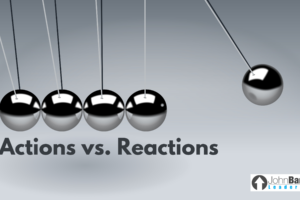The Crucial Leadership Lesson You’re Missing: Mastering Your Reactions
In leadership, your reactions are far more telling and impactful than your initial actions. They serve as a window into your true character, revealing who you are when pressure mounts and challenges arise. Your effectiveness and influence as a leader are not just shaped by what you plan or how you set your actions but by how you respond in the heat of the moment.
Have you considered that your priorities should encompass not just what you do, but also how you behave? The term’ priority’ is derived from the Latin word ‘prior,’ which means ‘before.’ This implies that priorities are about decisions and actions made before an event. It’s this preparation that lays the groundwork for the choices you’ll make when challenges arise. As Stephen Covey wisely said, “The key is not to prioritize what’s on your schedule but to schedule your priorities.” This insight underscores the importance of aligning our actions with our pre-determined priorities rather than reacting impulsively when decisions must be made.
As a leader, it’s critical to pre-define how you will respond in various situations rather than waiting until you’re in the thick of it. This proactive approach helps you maintain control and navigate situations effectively rather than allowing circumstances or emotions to dictate your actions. Think about it—how many times have you found yourself off-kilter because you didn’t prioritize correctly? The same principle applies to your reactions. If you wait to decide how to react when you’re already in the moment, you’re likely to make decisions that don’t align with your long-term goals or values.
To truly master this, consider adopting the “If/Then” approach, a concept rooted in psychology that helps individuals make decisions ahead of time. For example, if you know a situation is likely to provoke a strong emotional response, you can plan how to react in advance. This not only prepares you mentally but also allows you to align your reactions with your values and leadership goals.
Your reactions are also a reflection of your internal priorities. When you respond with grace under pressure, it shows that you value patience and control. If you lash out in frustration, it might indicate that you haven’t prioritized managing your emotions. This is why it’s essential to include behavior in your list of priorities—how you choose to react in various scenarios is just as important as the actions you take.
Your reactions reveal your true leadership character more than your actions do. They show your team, colleagues, and even yourself what you truly value. They build or erode trust and respect, influencing how others perceive and respond to you. As my mentor, Dr. John C. Maxwell, famously said, “Everything rises and falls on leadership.” This includes your ability to manage your reactions, which directly impacts your influence and effectiveness as a leader.
As you move forward in your leadership journey, take the time to prioritize your reactions. Decide now how you will respond to stress, conflict, and challenges. By doing so, you’ll align your leadership with your core values and ensure that you’re leading with intentionality and purpose, not just in your actions but in every reaction as well.
Your ability to manage your reactions effectively will not only enhance your leadership but also inspire and influence those around you in massive ways.









